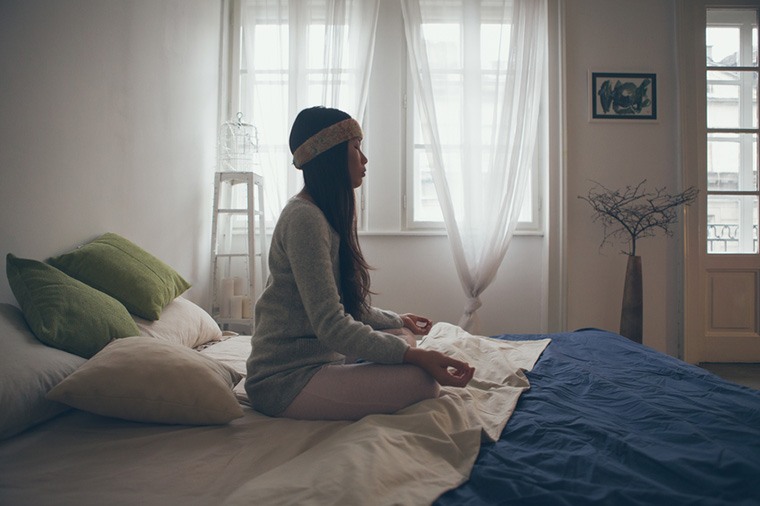When to Seek Out Alternative Medicine—and When to Go Mainstream
Western medicine and alternative healing are kind of like leggings and leather jackets—at one point it was rare to see them paired together, but now they're considered to be a pretty perfect match.
For proof, just take a stroll through any major US hospital. “Therapies such as acupuncture, meditation, and yoga, which were unheard of many years ago, are now commonly offered to patients while receiving cardiac, oncology, and fertility treatments, to name but a few,” says Nada Milosavljevic, MD, a board-certified physician, faculty member at Harvard Medical School, and founder of Sage Tonic, which creates wellness "tool boxes" for common medical maladies.
So how do you know whether your headaches merit an herbal tincture or an Rx for Imatrex? The short answer: It’s really complicated.
That said, not all alt-therapies have attained BFF status with their conventional counterparts. (You won’t find many shamanic healing ceremonies going down in the ICU.) Plus, there’s still some debate in the medical community around when it’s appropriate to seek out alternative treatments and when traditional interventions are best.
So how do you know whether your headaches merit an herbal tincture or an Rx for Imatrex?
The short answer: It’s really complicated. But while every practitioner has her own opinion on the topic, there are some guidelines that all docs and holistic healers can agree upon.
Keep reading to find out when you should stick with conventional medicine and when it’s okay to go the holistic route.

Can I explore holistic healing on my own?
On the more traditional tip, some doctors insist that if you’re seeking out a complementary therapy, it’s crucial to consult with them—even if it’s something as seemingly harmless as yoga to quell anxiety.

{{post.sponsorText}}
“It’s important to have an evaluation and discuss treatment options with a health care provider to make sure you receive the best care possible,” says Wendy Weber, ND, PhD, a branch chief of clinical research at the National Center for Complementary and Integrative Health. “Once you have a clear diagnosis, then you can explore what treatments are best for you with your providers.”
"While many herbs are safe to use, there's always the potential for them to interact with medications the patient may currently take."
Other docs, however, say super-low-risk modalities usually don’t require their sign-off. “For a mild condition like day-to-day stress, trying meditation or acupressure might be fine,” says Dr. Milosavljevic.
One thing’s for sure: If you’re taking medication, you should definitely talk to your doctor before adding anything ingestible to your treatment regimen. “Let’s say a patient is on several medications and is interested in trying an herbal treatment,” says Dr. Milosavljevic. “While many herbs are safe to use, there's always the potential for them to interact with medications the patient may currently take.”

Are some alternative treatments more legit than others?
Some doctors won’t wholeheartedly recommend a holistic therapy unless it has a library’s worth of evidence behind it for the specific condition in question. But that kind of heavy research isn’t always readily available in the world of alt-health.
For example, the NCCIH claims research is too limited to prove acupuncture is a valid fix for anxiety, even though just about anyone in the Chinese medicine world would call foul on that logic. Meanwhile, the same organization has given acupuncture the thumbs-up for treating back pain, since extensive research has proven it works.
Holistic practitioners also take science into consideration, of course—but their practices have often been tested and confirmed over centuries. For many, that’s proof enough of their craft’s legitimacy (even if mountains of data aren’t there).
Holistic practitioners also take science into consideration, of course—but their practices have often been tested and confirmed over centuries.
Take that acupuncture example, for instance. “From the perspective of Chinese medicine, acupuncture can help with everything,” says Ro Giuliano, an acupuncturist and herbalist at Brooklyn’s Maha Rose Center for Healing Arts. “But sometimes it would stand alone, and sometimes it would be in conjunction with Western medicine.” (More on that in a minute.)
Either way, always do your homework to ensure the treatment you’re curious about has been deemed safe for your condition. (Check out the NCCIH for all the deets—and, of course, ask your doctor.)
And once you’ve determined you’re in the no-sketch zone, make certain your holistic pro is the real deal. “It’s important that you seek out trained, licensed, or certified providers of any complementary health approach that you decide to use,” Weber stresses.

Are there any cases where Western is always best?
There’s no debating this one: If you’re seriously sick or injured, haul ass to a Western doctor.
Even holistic practitioners, like Ayurvedic naturopath Meghana Thanki, will co-sign this. “We can do so much with Ayurveda, but I feel there’s definitely a place for Western medicine—mostly for emergencies and for some of their diagnostic tools,” she says. Herbalists will also make the case for pharmaceuticals in certain situations. “Even though there are herbs with antimicrobial properties, there are a lot of times where you just need antibiotics,” says Giuliano.
"Even though there are herbs with antimicrobial properties, there are a lot of times where you just need antibiotics."
That’s not to say that alternative therapies can’t buddy up with conventional treatments—like getting reiki while receiving cancer treatment—but again, it’s important to get your doctor’s blessing first. “Some alternative therapies might not be possible for some conditions, due to their severity or complexity,” points out Dr. Milosavljevic.
Bottom line: It’s always best to err on the side of caution, so pursue science-backed holistic treatments in conjunction with Western medicine, where appropriate—and make sure your doctor stays in the loop.
The health world is full of hot debates: Is coffee really good for you? Are long or short workouts better? Big breakfast or a small one?
Loading More Posts...